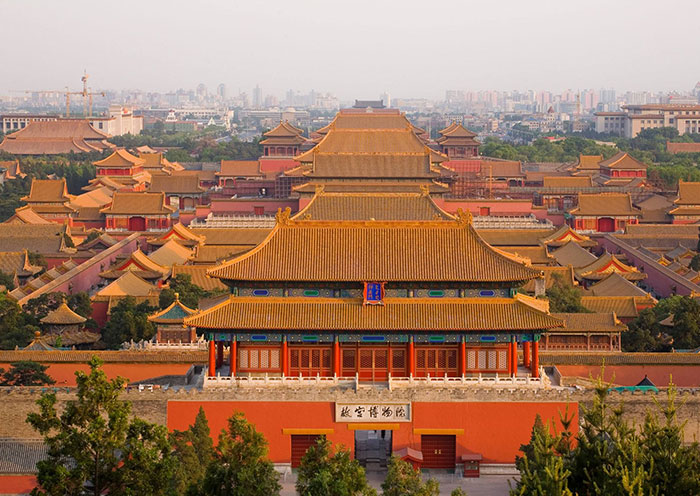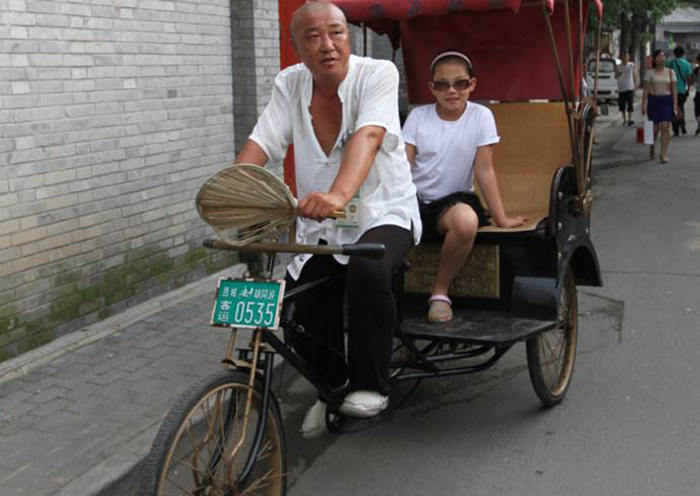Accommodation:Overnight in Beijing
First up on your visit to Beijing is the world's largest plaza - Tian'anmen Square. The grandiose Tian'anmen Gate is the place where Chairman Mao Ze Dong announced the establishment of the People's Republic of China to the world in 1949. Passing through Tian'anmen Gate, you will enter the ancient and splendid Forbidden City, the home of 24 emperors of the Ming and Qing Dynasties for nearly 600 years. Magnificent architecture, intricate ornaments and touching legends make this a must-see site while in China.
After lunch, you'll visit the stunning and exquisite Summer Palace, where you'll be amazed at the vast ensemble of lakes, gardens, temples and palaces that together make up a masterpiece of Chinese landscape garden design. During the Qing Dynasty, the Summer Palace was the personal summer retreat of the royal family. The overall layout of the Summer Palace consists of a front hill, back hill, and Kunming Lake. The front hill area contains splendid halls and pavilions while the back hill provides quiet, natural beauty.
After visiting these sites, we will take you back to your hotel to relax.
Accommodation:Overnight in Beijing
After hiking the Great Wall of China at Mutianyu, we will take you back to downtown Beijing, but along the way we will stop at the solemn Ming Tombs, the final resting place of the ancient emperors of the Ming Dynasty. Here you can wander along the Sacred Road, a tranquil path that in the past was reserved for royalty. The road is lined with statues of devine animals and officials as it leads to the mysterious Underground Palace, which we will also visit. One last stop before returning to your hotel will be at the Beijing Olympic Village, where you will have the opportunity to take some pictures of the outsides of the instantly recognizable "Bird's Nest" stadium and the Water Cube.
Accommodation:Overnight in Beijing
After your hutong lunch experience, we will move on to a masterpiece of Chinese architecture, the iconic Temple of Heaven, where for centuries the ancient Chinese emperors prayed for a good harvest nationwide every year. Today the outer areas of the Temple of Heaven are a public park where the locals gather to practice Tai Chi, fly kites, play mah jong and chat, while the inner area of the temple is a historic site for visitors to learn about Chinese history and culture.
The rest of the day will be free for you to relax and prepare for tomorrow’s flight to Lhasa.
Accommodation:Overnight in Beijing
Tips for High Altitude Acclimatization:
1) Go for a leisurely walk in the fresh high altitude air, but avoid any strenuous activity after your arrival.
2) It's better to avoid taking a bath to avoid catching a cold.
3) Drink plenty of water to avoid dehydration, and eat some fresh fruit.
4) Get plenty of rest.
Accommodation:Overnight in Lhasa
From one historic landmark to another, your next stop will be at the Jokhang Temple, considered as the spiritual heart of Tibetan Buddhism. Every day thousands of pilgrims come from all over Tibet and other places to the temple to worship the Buddha. The Jokhang Temple is also known as the "House of Buddha" because it houses the precious Jowo Rinpoche, a life-sized (1.5 meter/5 feet) image of the Shakyamuni at the age of 12.
The last stop for today's Lhasa exploration is Barkor Street, the wide, circular street that surrounds the Jokhang Temple. Local residents enjoy walking on the street, completing several circuits around the temple as a daily tradition of pilgrimage. The street also has many small shops selling a wide variety of traditional Tibetan goods, religious items and handicrafts.
Tips for today's tour:
1) There are 1,080 steps to the top of the Potala Palace, so it's best to take it slowly to avoid high altitude sickness.
2) Taking photos is not allowed inside the Potala Palace.
3) Most of today will be spent outside, so please bring a hat, sunscreen, sunglasses and some water with you to protect yourself from the more intense sun at the higher altitude.
Accommodation:Overnight in Lhasa
After visiting the palaces and park at Norbulingka, we will travel around 5 kilometers to the western outskirts of Lhasa to visit the Drepung Monastery. The word "drepung" in Tibetan language means "prosperity". Since its establishment in 1416, Drepung Monastery has served as one of the most important Buddhist monasteries in Tibet. During its prime, more than 10,000 monks lived and studied in the monastery. Throughout its history, many important and famous Tibetan leaders studied at as the “Mother School of Dalai Lamas”.
In the afternoon, we will escort you on to another famous monastery in Lhasa - the Sera Monastery. Sera Monastery is famous for its spectacular “Buddhist Debates”. As a daily routine, the monks gather in a courtyardthis monastery, including the Dalai Lamas. Accordingly, Drepung Monastery is also respectfully known, and debate on the various Buddhist doctrines with exaggerated gestures, which is thought to be helpful in facilitating a better comprehension of the Buddhist philosophy to attain higher levels of study. After enjoying the "Buddhist Debates", we will take you back to your hotel with the rest of the day and evening to relax or explore on your own.
Accommodation:Overnight in Lhasa
Today's Tips:
1) Please take care to pack all of your belongings, particularly the small things that are easy to forget about, such as phone and camera chargers, power adapters, mobile phones, wallets, etc.
2) If your flight or train is in the afternoon, please be sure to check out of your hotel room by 12 p.m.
Accommodation:None














































 Data in submission...
Data in submission...